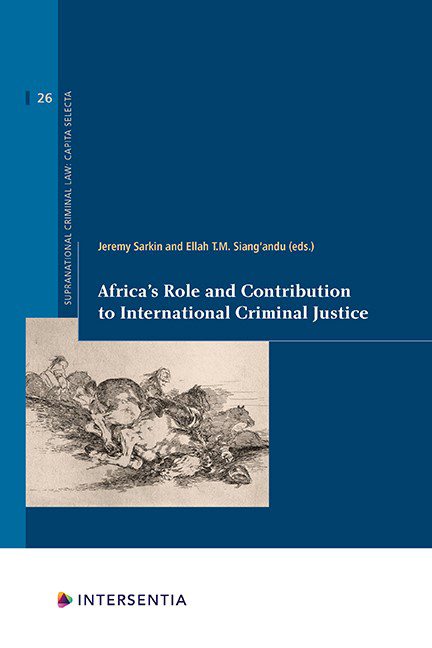Book contents
- Frontmatter
- Acknowledgements
- Contents
- List of Contributors
- Introduction: Understanding the Meaning, Context, Role and Importance of African Criminal Justice on the Continent and Beyond
- Types of International Criminal Courts in Africa
- The Extraordinary African Chambers in the Senegalese Courts and the Development of International Criminal Law in Africa
- The Use of International Criminal Law in African Countries
- The Nuremberg Principles in the Context of Africa: The Theory and Practice of Individual and Corporate Criminal Responsibility
- The Application of Universal Jurisdiction in Africa
- African Victims of Mass Atrocities Before Domestic Jurisdictions and the International Criminal Court: Bargaining for Justice
- The Role of the International Criminal Court in Africa: The Epic Fails?
- Is the African Court on Human and Peoples’ Rights with Criminal Jurisdiction an African Solution to an African Problem?
- Head of State Immunity in the African Context
- Index
The Application of Universal Jurisdiction in Africa
Published online by Cambridge University Press: 11 February 2021
- Frontmatter
- Acknowledgements
- Contents
- List of Contributors
- Introduction: Understanding the Meaning, Context, Role and Importance of African Criminal Justice on the Continent and Beyond
- Types of International Criminal Courts in Africa
- The Extraordinary African Chambers in the Senegalese Courts and the Development of International Criminal Law in Africa
- The Use of International Criminal Law in African Countries
- The Nuremberg Principles in the Context of Africa: The Theory and Practice of Individual and Corporate Criminal Responsibility
- The Application of Universal Jurisdiction in Africa
- African Victims of Mass Atrocities Before Domestic Jurisdictions and the International Criminal Court: Bargaining for Justice
- The Role of the International Criminal Court in Africa: The Epic Fails?
- Is the African Court on Human and Peoples’ Rights with Criminal Jurisdiction an African Solution to an African Problem?
- Head of State Immunity in the African Context
- Index
Summary
INTRODUCTION
The existence of universal jurisdiction is a subject of controversy and debate, and its application in Africa has sometimes caused a stir, sparking allegations that the doctrine is unfairly used to target African leaders. Some scholars doubt its legitimacy and argue that it lacks a basis in state practice and is not supported by cogent authorities. This chapter explores the application of universal jurisdiction within Africa. It attempts to demonstrate that the doctrine of universal jurisdiction is founded in customary international law and is evident in state practice, and also manifests itself several other legal authorities. The focus of the chapter is the African continent. It begins with an overview of what constitutes universal jurisdiction. This is important in order to understand what constitutes universal jurisdiction in international law. The next section draws on recognisable authorities to demonstrate that universal jurisdiction is an established doctrine in international law. This is followed by another section discussing the application of universal jurisdiction in Africa. The third section of the chapter is divided into two parts: the first part discusses universal jurisdiction at the African Union (AU) level, while the second looks at universal jurisdiction at the national level. At the AU level, the discussion seeks to draw on the regional normative mechanisms to establish the recognition of universal jurisdiction by African states. At the national level, it seeks to demonstrate that universal jurisdiction is either recognised or has actually been enforced by some African states. Finally, a conclusion is drawn.
UNIVERSAL JURISDICTION: AN OVERVIEW
The existence of universal jurisdiction is not universally acknowledged. Matthew Garrod (2018: 129), for example, argues that universal jurisdiction is merely a hollow concept that is not backed by state practice and that its assertion is based on misconceived views of duties arising from treaty obligations to extradite or prosecute. Accordingly, this would mean the doctrine does not exist and what is considered as universal jurisdiction is nothing more than a mistaken view of the correct position of the law. Therefore, universal jurisdiction does not exist. Similarly, Reydams (2010: 26) argues that universal jurisdiction is ‘an unhelpful misnomer’, a post-Cold War invention perpetuated by non-governmental organisations, human rights activists, lawyers, over-zealous judges, academics and the mass media.
- Type
- Chapter
- Information
- Africa's Role and Contribution to International Criminal Justice , pp. 137 - 154Publisher: IntersentiaPrint publication year: 2020



